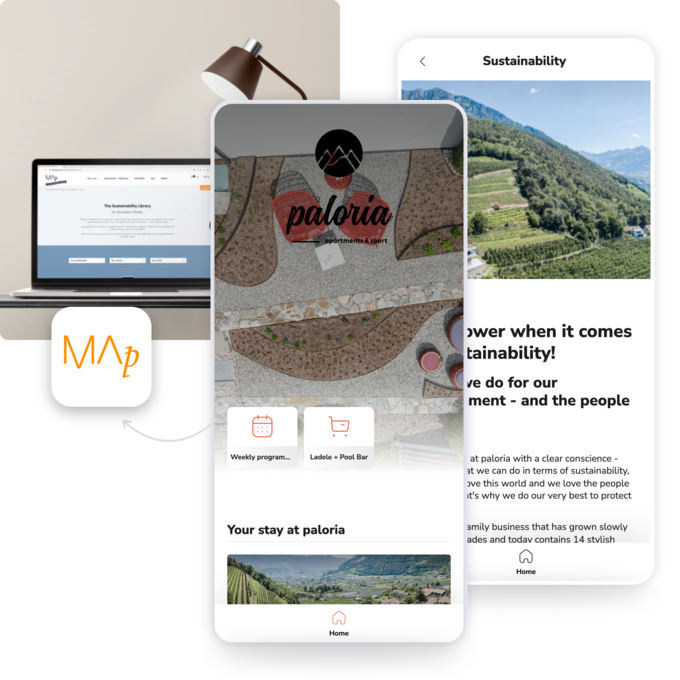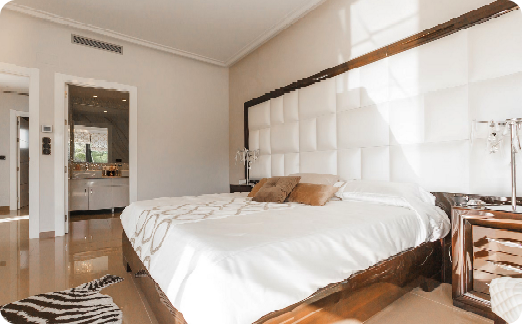Sustainability in the Hospitality Industry: A Conversation with Magdalena
The company's focus lies in the areas of marketing, branding, and positioning to ensure sustainable success for its clients. Additionally, MAP Boutique Consultancy has developed the sustainability platform "The Sustainable Hotel," which places the topic of sustainability at the center of the hospitality industry. The platform supports the community with expertise, suitable tools, and practical resources.
We asked Magdalena Rungaldier, Principal of MAP Boutique Consultancy, a few questions on the subject.

Voices on the Collaboration
Sustainable hotels are the future—for the benefit of people, the planet, and business success. Sustainability offers ecological and social advantages and is also good for business!
Here are some benefits a sustainable hotel can enjoy:
- Attractive to guests: Sustainable practices attract more (and new) guests.
- Increased guest loyalty: Hotels that operate responsibly are appreciated, recommended, and see return visitors.
- Cost efficiency: Sustainable practices reduce resource consumption, such as water and energy, in the long term.
- Resilience: Sustainable hotels are better prepared for challenges like supply chain issues and changing regulations.
- Investment appeal: Sustainable businesses are more attractive to public and private investors.
- Long-term value and inspiration: Sustainable hotels provide value to guests, employees, and partnerships while supporting local communities.
The relationship between hotels and the ecosystem is often complex—and unfortunately, unhealthy. Hotels have significant environmental impacts throughout their lifecycle.
To counteract this, hotels can:
- Use renewable energy sources,
- Implement carbon offset mechanisms,
- Promote climate-friendly transportation (e.g., by providing collective transfers to the airport).
In our practical guide “The Sustainable Hotel Handbook: Planet” we identify four key areas: energy, water, food, and waste. For each area, you’ll find numerous actionable measures.
Social sustainability, on the other hand, means creating a positive impact for people—including guests, employees, business partners, and society at large. This includes:
- Being open and respectful to guests of all backgrounds,
- Ensuring accessibility,
- Paying employees above minimum wage,
- Prioritizing local partnerships,
- Preserving the cultural identity of the region.
Our guide “The Sustainable Hotel Handbook: People” provides exercises and specific measures to support social sustainability for four key stakeholder groups: guests, employees, local communities, and partners.
As a creative hotel consultancy, we assist hotels in various areas, including development, branding, marketing strategies, and hotel websites—all of which can be approached sustainably.
We believe future hotels and brands must integrate sustainability to remain relevant. For instance, we don’t just create beautiful and effective hotel brands; we ensure they are inherently sustainable to guarantee our clients’ success.
In terms of positioning, we help hotels stand out in a competitive market through sustainable practices. We demonstrate that sustainable operations not only improve the hotel’s image but also boost guest satisfaction and loyalty.
Do we also offer dedicated sustainability consulting for hotels? Yes! Our sustainability consulting is designed as a practical coaching program. Over eight weeks, we develop a clear action plan and conduct an intensive team workshop.
We’ve also created a free sustainability assessment that allows hoteliers to evaluate their current sustainability status, complete with valuable tips and actionable recommendations.
Yes, an excellent example is Koncept Hotels, which excels in social sustainability. Their vision of a fair, digital, and efficient hotel concept has proven resilient in times of crisis and is highly appreciated by guests.
Some of their initiatives include:
- Transparency and fairness: Employees share their stories on the Koncept Hotels website, strengthening company culture.
- Fair pay: Salaries across all roles exceed industry averages, with equitable and fair compensation.
- Gender equality: The group actively reduces income disparities between men and women, aiming for gender parity.
- Inclusion of disadvantaged groups: Individuals from disadvantaged backgrounds are actively integrated into daily operations, supporting anti-discrimination and equity initiatives.
- Flexible working arrangements: Employees benefit from flexible part-time models, supporting work-life balance.

Great question! Here are some tips:
- Check certifications: Does the hotel have sustainability certifications like the Good Travel Seal or B-Corp? Be cautious of marketing cooperatives that require little more than an annual fee. Genuine certifications matter! Check out the helpful list from the Sustainable Hospitality Alliance.
- Sustainable food: Look for regional and seasonal products on the hotel’s menus. Commitment to local suppliers is often a good indicator.
- Reporting: Does the hotel regularly report on sustainability progress? Look for sustainability reports or annual summaries documenting goals and achievements.
- Transparency in communication: How are sustainability efforts communicated? Ensure inclusivity, clarity, and cultural sensitivity.
- Sustainable travel options: Does the hotel promote eco-friendly transport, such as EV charging stations or partnerships with public transit?
- Guest reviews: Reviews often hint at whether a hotel is genuinely sustainable or making empty promises.
- Other details: Are energy and water-saving systems in place? Is waste separated? Are single-use plastics minimized? Are local staff and businesses welcomed in hotel facilities?
Additionally, they can directly access offers or activities that support the hotel's sustainable efforts, allowing them to make their stay even more mindful.

In general, and not just regarding sustainability, it’s crucial to know where you stand, what you stand for, and where you want to go. As the saying goes, “Hope is not a strategy.”
Strategic planning, a unique concept, a creative brand, and targeted communication and sales strategies make all the difference.
On sustainability: Don’t get discouraged! Sustainability is about progress, not perfection. While achieving 100% sustainability is a noble goal, in a rapidly changing world, it’s not realistic.
The key is a commitment to continuous learning and gradual improvement. Take it step by step!
Ready to make it happen?
MAP develops the hotels of the future – sustainable, unique, and innovative – in collaboration with independent hoteliers, entrepreneurs from the hospitality industry, and investors worldwide. Want to learn more? Feel free to contact Magdalena directly: magdalena@map-consultancy.com
Hier geht's zur Webseite



